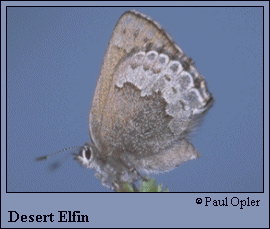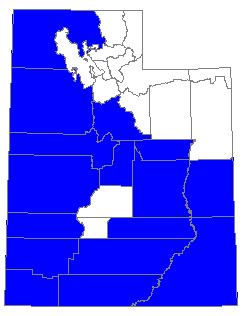 |
 

 |



Desert Elfin (Callophrys fotis [Strecker])
Wing span: 3/4 - 1 1/8 inches (1.9 - 2.8 cm).
Identification: Upperside gray; underside brownish gray. Base of hindwing darker, outer half gray to yellow-gray.
Life history: Males perch near host plants on trees and shrubs to wait for females. Eggs are laid singly on flower buds of the host; caterpillars feed on buds, flowers, and young fruits. Chrysalids hibernate.
Flight: One flight from March-June.
Caterpillar hosts: Cliff rose (Cowania mexicana var. stansburiana) in the rose family (Rosaceae).
Adult food: Not reported.
Habitat: In desert rocky canyons, hills, and scrub.
Range: Southeastern California, southern Nevada, central Utah, southwest Colorado, northern Arizona, and northwestern New Mexico.
Conservation: Not thought to be in need of conservation.
The Nature Conservancy Global Rank: G3 - Very rare or local throughout its range or found locally in a restricted range (21 to 100 occurrences). (Threatened throughout its range).
Management needs: Not reported.
References:
Scott, J. A. 1986. The butterflies of North America. Stanford University Press,
Stanford, Calif. 583 pages, 64 color plates.
Tilden, J. W. 1986. A field guide to western butterflies. Houghton-Mifflin Co.,
Boston, Mass. 370 pages, 23 color plates.
Author: Jane M. Struttmann
State and Regional References:
Ferris, C.D. and F.M. Brown. 1980. Butterflies of the Rocky Mountain States.
University of Oklahoma Press. Norman.
Opler, Paul A. 1999. Peterson Field Guide to Western Butterflies, revised
edition. Houghton Mifflin Co., Boston, Mass.
Stanford, R.E. and P.A. Opler. 1993. Atlas of Western USA Butterflies.
Privately published, Denver, Colo.
Tilden, J.W. and A.C. Smith. 1986. A Field Guide to Western Butterflies.
Houghton Mifflin Co., Boston, Mass.

